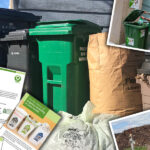Top: The New York City Department of Sanitation started bagging compost this past summer at its Staten Island Compost Facility.

A GORE® covered aerated static pile composting system supplied by Sustainable Generation, Inc. is under construction at the SICF and will be used for food scraps and yard trimmings composting. Photos courtesy of WeCare Denali
The Staten Island Compost Facility (SICF), located on the long-closed Fresh Kills Landfill on Staten Island (NY), is owned by the New York City Department of Sanitation (DSNY) and operated by WeCare Denali, a subsidiary of Denali Water Solutions. The facility is permitted by the New York State Department of Environmental Conservation to process 105,000 cubic yards/year of leaves, brush and wood, and about five years ago, was approved to accept up to 150 tons/day of source separated organics (600 tons/week). That approval is contingent on installation of an advanced composting system that includes leachate control. To meet that requirement, after an extensive assessment of advanced composting technologies led by WeCare Denali, DSNY decided to install a GORE® covered aerated static pile composting system supplied by Sustainable Generation, Inc. Construction of the system was delayed due to the pandemic, but is now underway.
“The GORE system will allow us to take in much more food waste, but just as importantly, it will decrease our overall composting process time (cut it in half),” notes Brian Fleury, Executive Vice President–Facilities at Denali Water. “We anticipate the system will be operational in about a year.” In addition to yard trimmings, DSNY diverts food scraps collected from residents and institutions, such as the public schools. That included material picked up curbside as part of the City’s brown bin program that was suspended during the pandemic. “Prior to the pandemic, we received up to 30 tons/week of food scraps, with residential accounting for roughly two-thirds and institutions about one-third,” adds Fleury. “The curbside program just started back up, so it is too early to report quantities received and compare to pre-pandemic numbers.”
Staten Island Composting currently does not accept pre or postconsumer commercial food scraps. Knowing that it will take an extended period of time to ramp up the volume of food scraps being received, WeCare Denali plans to utilize the extra capacity available in the GORE system for straight yard trimmings. “Once we are taking in consistent large(r) amounts of food waste, we’ll be using a significant amount of the ‘brown’ yard waste (brush, leaves, wood chips) as bulking agent and to balance the carbon to nitrogen ratios,” he explains. Retention time in the system will be about 21 to 28 days in Phase I active composting, 14 to 21 days in Phase II curing under the covers, and 14 days in outside curing.
In 2016, WeCare Denali was tasked through its contract with DSNY to purchase depackaging equipment, and selected the Tiger (supplied by Ecoverse). Food scraps are collected with yard trimmings on the residential route. At the facility, as much of the yard trimmings as possible are manually and mechanically separated before the food residuals and packaging are loaded into the feed hopper of the Tiger. Incoming material from institutions is loaded directly into the depackager. The newest piece of equipment at SICF is an automated bagging machine that started making bags of Big Apple Compost® this past summer (2021). The Hamer Model 2090 with a robotic stacker is housed in a new tensioned fabric covered building and is rated to fill in excess of 20 bags/minute. “We will be filling up to 200,000 bags/year for now, which will account for about 20% of the facility’s annual compost production,” notes Fleury. “Currently, all the bagged material is for give-backs only. DSNY has an extensive outreach program with city agencies, schools, nonprofits, etc. that can request compost. We have excess bagging capacity and will be exploring options.”














